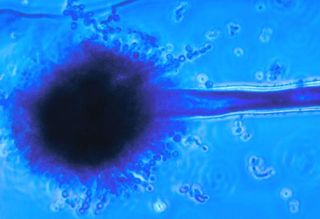Can You Catch Meningitis?

Some forms of meningitis are contagious, but fungal meningitis — the type responsible for the recent outbreak — is not.
So far, 105 people have been affected by the fungal meningitis outbreak, which is linked to contaminated steroid injections.
Meningitis is a swelling or inflammation of the membranes that cover the brain and spinal cord (which are called the meninges). A number of things can cause meningitis, including bacteria, viruses, and fungi. [See: 5 Meningitis Facts You Need to Know]
When meningitis is caused by a virus or bacteria — as is most common — it can spread from person to person. Bacterial meningitis can spread through kissing, and viral meningitis can spread when people come in contact with the feces of an infected person, which can happen when changing a diaper, or when a person does not properly wash their hands after using the toilet, according to the Centers for Disease Control and Prevention.
Other causes of meningitis are not contagious. For example, meningitis can be caused by head injuries, brain surgery and some cancers, the CDC says.
Meningitis that is caused by fungi is not contagious. The people sickened in the recent fungal meningitis outbreak are thought to have become infected when they were injected with a steroid drug that was contaminated with fungus. Injections were delivered into their spines — allowing the fungus to enter their spinal fluid and spread to their brain.
The types of fungi involved in the outbreak, such as Aspergillus, are common in the environment, and usually don't cause problems in healthy people.
Sign up for the Live Science daily newsletter now
Get the world’s most fascinating discoveries delivered straight to your inbox.
The number of cases in the fungal meningitis outbreak is still going up because some people who received the contaminated injections before they were recalled by the manufacturer could still develop symptoms — they can take up to four weeks to appear. In other cases, people may have fallen sick sometime in the past several months after receiving an injection, but doctors are now better able to identify the cause of their illnesses.
Pass it on: Fungal meningitis cannot spread from person to person.
This story was provided by MyHealthNewsDaily, a sister site to LiveScience. Follow MyHealthNewsDaily on Twitter @MyHealth_MHND. We're also on Facebook & Google+.
Most Popular



